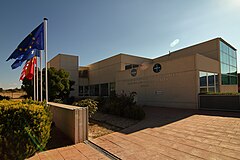Madrid Deep Space Communications Complex
 Madrid Deep Space Communication Complex (MDSCC) | |
 | |
| Alternative names | MDSCC |
|---|---|
| Organization | INTA / NASA / JPL |
| Location | Robledo de Chavela (near Madrid), Spain |
| Coordinates | 40°25′45″N 4°14′57″W / 40.42917°N 4.24917°W |
| Altitude | 720 m |
| Established | 1961 |
| Website | mdscc.nasa.gov |
| Telescopes | |
| | |
The Madrid Deep Space Communications Complex (MDSCC; in Spanish and officially Complejo de Comunicaciones de Espacio Profundo de Madrid) is a satellite ground station located in Robledo de Chavela, Spain, and operated by the Instituto Nacional de Técnica Aeroespacial (INTA).[1] Part of the Deep Space Network (DSN) of NASA's Jet Propulsion Laboratory (JPL), along with its two sister stations at Goldstone, California and Canberra, Australia it is used for tracking and communicating with NASA's spacecraft, particularly interplanetary missions. The DSN and the Near Space Network (NSN) are services of the NASA Space Communications and Navigation program (SCaN).[2]
Deep Space Network
[edit]The MDSCC is part of NASA's Deep Space Network run by the Jet Propulsion Laboratory.[3] The facility contributes to the Deep Space Network's mission to provide the vital two-way communications link that tracks and controls interplanetary spacecraft and receives the images and scientific information they collect. The complex is one of three NASA Deep Space Network complexes in the world, located at separations of approximately 120° longitude so that a spacecraft will always be in sight of at least one station; the others are the Goldstone Deep Space Communications Complex located in California, near the city of Barstow, and the Canberra Deep Space Communication Complex in Australia which is close to the city of Canberra.[4]
The complex also serves some missions of the European Space Agency.
Functions
[edit]The antennas and data delivery systems make it possible to:
- Acquire telemetry data from spacecraft.
- Transmit commands to spacecraft.
- Track spacecraft position and velocity.
- Perform Radio Astronomy (both single-dish and very-long-baseline interferometry) observations.
- Measure variations in radio waves for radio science experiments.
- Monitor and control the performance of the Deep Space Network.
Antennas
[edit]

The complex has eight large parabolic antennas, called DSS-61, DSS-54, DSS-55, DSS-56, DSS-63, DSS-65 and DSS-66.[5]
| Photo | Name | Diameter | Notes |
|---|---|---|---|
| DSS-61 | 34-meter | In late 1999 DSS-61 was deactivated, and in February 2001 NASA transferred the antenna to create the PARTNeR Project. | |
| DSS-53 | 34-meter | beam waveguide antenna entered operations in February 2022[6] | |
 |
DSS-54 | 34-meter | beam waveguide antenna |
| DSS-55 | 34-meter | beam waveguide antenna | |
| DSS-56 | 34-meter | beam waveguide antenna. Entered service in January 2021 | |
 |
DSS-63 | 70-meter | Built in 1974 as a 64-meter antenna, and upgraded to 70 metres in the late 1980s. It can transmit in S and X-band with a power up to 400 kilowatts and receive in L, S, and X bands. DSS-63 weighs a total of 8000 tons, whereby the dish has a weight of 3500 tons. Its reflecting surface is 4,180 square metres (45,000 sq ft). |
| DSS-65 | 34-meter | Built in 1987. It is a HEF (high-efficiency) antenna. It can transmit in X-band with a maximum power of 20 kW and receive in S- and X-band. The weight of DSS-65 is 400 tons, whereby the dish weighs 350 tons. | |
| DSS-66 | 26-meter | The antenna was used in support of near-Earth missions and the early orbit phase of deep-space missions. This antenna was moved in 1983 from the nearby Fresnedillas NASA tracking station, prior to that station being shut down in 1985. It was decommissioned in 2009. |
See also
[edit]References
[edit]- ^ "NASA Deep Space Communications Complex (Robledo de Chavela)". Instituto Nacional de Técnica Aeroespacial. Retrieved 4 December 2022.
- ^ "SCaN Ground Segment". eoportal.org. 25 January 2021. Retrieved 4 December 2022.
- ^ Official site for DSN at JPL Archived 8 June 2012 at the Wayback Machine
- ^ Latifiyan, Pouya (April 2021). "Space Telecommunications, how?". Take off. 1. Tehran: Civil Aviation Technology College: 15 – via Persian.
- ^ Official INTA site for the MDSCC Archived 25 March 2014 at the Wayback Machine
- ^ "NASA's "Interplanetary Switchboard" Adds Enormous New Dish To Communicate With Deep Space Missions". SciTechDaily.com. 20 March 2022. Retrieved 4 December 2022.

